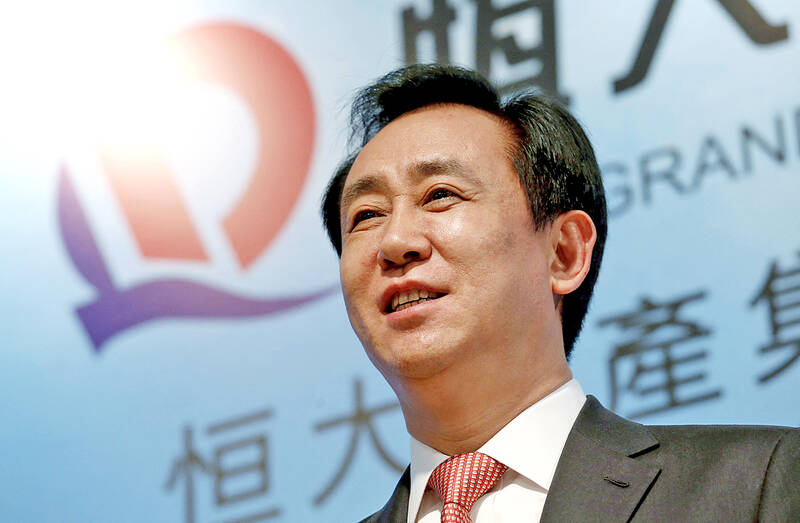The billionaire boss of beleaguered Chinese property developer Evergrande Group (恆大集團) is being held by police, a report said yesterday, as the debt-ridden company grapples with severe financial difficulties.
Xu Jiayin (許家印), who is known as Hui Ka Yan in Cantonese, was taken away by authorities earlier this month, anonymous sources cited by Bloomberg News said.
He is being held under “residential surveillance,” the report said, which does not mean he has been arrested or charged with a crime.

Photo: Reuters
Evergrande did not respond to a request for comment.
The 65-year-old chairman was once China’s richest man, with a taste for luxury labels and yachts, and a nose for praising the Chinese Communist Party that steered the economy to a home-ownership boom.
Xu’s wealth is now estimated at US$1.8 billion — down from US$42 billion in 2017 — according to the Bloomberg Billionaires Index.
On Sunday evening, Evergrande announced that it was unable to issue new debt as its subsidiary, Hengda Real Estate Group Co (恆大地產集團), missed a key debt payment and was being investigated.
Chinese financial Web site Caixin reported that former executives at the unit had been detained.
That came two days after the company said that meetings this week on a key restructuring plan would not take place.
It added that it was “necessary to reassess the terms” of the plan to suit the “objective situation and the demand of the creditors.”
Earlier this month, authorities in the southern city of Shenzhen said they had arrested several Evergrande employees, and urged the public to report any cases of suspected fraud.

Nvidia Corp CEO Jensen Huang (黃仁勳) is expected to miss the inauguration of US president-elect Donald Trump on Monday, bucking a trend among high-profile US technology leaders. Huang is visiting East Asia this week, as he typically does around the time of the Lunar New Year, a person familiar with the situation said. He has never previously attended a US presidential inauguration, said the person, who asked not to be identified, because the plans have not been announced. That makes Nvidia an exception among the most valuable technology companies, most of which are sending cofounders or CEOs to the event. That includes

TARIFF TRADE-OFF: Machinery exports to China dropped after Beijing ended its tariff reductions in June, while potential new tariffs fueled ‘front-loaded’ orders to the US The nation’s machinery exports to the US amounted to US$7.19 billion last year, surpassing the US$6.86 billion to China to become the largest export destination for the local machinery industry, the Taiwan Association of Machinery Industry (TAMI, 台灣機械公會) said in a report on Jan. 10. It came as some manufacturers brought forward or “front-loaded” US-bound shipments as required by customers ahead of potential tariffs imposed by the new US administration, the association said. During his campaign, US president-elect Donald Trump threatened tariffs of as high as 60 percent on Chinese goods and 10 percent to 20 percent on imports from other countries.

Taiwanese manufacturers have a chance to play a key role in the humanoid robot supply chain, Tongtai Machine and Tool Co (東台精機) chairman Yen Jui-hsiung (嚴瑞雄) said yesterday. That is because Taiwanese companies are capable of making key parts needed for humanoid robots to move, such as harmonic drives and planetary gearboxes, Yen said. This ability to produce these key elements could help Taiwanese manufacturers “become part of the US supply chain,” he added. Yen made the remarks a day after Nvidia Corp cofounder and chief executive officer Jensen Huang (黃仁勳) said his company and Taiwan Semiconductor Manufacturing Co (TSMC, 台積電) are jointly

MARKET SHIFTS: Exports to the US soared more than 120 percent to almost one quarter, while ASEAN has steadily increased to 18.5 percent on rising tech sales The proportion of Taiwan’s exports directed to China, including Hong Kong, declined by more than 12 percentage points last year compared with its peak in 2020, the Ministry of Finance said on Thursday last week. The decrease reflects the ongoing restructuring of global supply chains, driven by escalating trade tensions between Beijing and Washington. Data compiled by the ministry showed China and Hong Kong accounted for 31.7 percent of Taiwan’s total outbound sales last year, a drop of 12.2 percentage points from a high of 43.9 percent in 2020. In addition to increasing trade conflicts between China and the US, the ministry said